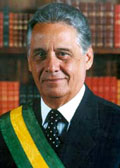Fernando Henrique Cardoso was educated as sociologist at the University of São Paulo and taught at various universities earning considerable popularity for his prolific writings and leftist views. In 1964 the military regime forced him into exile. Returning to Brazil in 1968, Cardoso was prosecuted for his views and again left Brazil. He returned in 1973 and in the late 1970s became involved in politics. He was elected alternate senator (1979-1983) and federal senator (1983-1992) for the State of São Paulo on the list of the Brazilian Democratic Movement Party (Partido do Movimento Democrático Brasileiro, PMDB). In 1988 he left PMDB and became a co-founder of the Brazilian Social Democratic Party (Partido da Social Democracia Brasileira). Cardoso served as foreign minister (5 Oct 1992 - 20 May 1993) and finance minister (21 May 1993 - 5 Apr 1994) under President Itamar Franco. Cardoso was responsible for implementing the Plan Real, a successful economic strategy, which resulted in dropping inflation rate from several thousand percent to less than 30 percent. Acquiring popularity with his economic policies, Cardoso won a sweeping victory in the 1994 presidential elections. Backed by a majority coalition in the National Congress, Cardoso passed fundamental legislative reforms dramatically reducing government involvement in the economy. The Cardoso administration privatized major state enterprises and attracted more foreign investments. A land reform added to Cardoso's popularity in rural Brazil. The Congress voted an amendment (4 Jun 1997) to the Constitution of 1988, allowing the president to stand for re-election. Despite worsening economic conditions, Cardoso was re-elected President of the Republic on 4 Oct 1998, for the second time defeating his leftist opponent, Luís Inácio Lula da Silva. Cardoso became the first Brazilian president to be democratically elected for two consecutive terms. |
| Candidate |
Popular vote (3 Oct 1994) [2] |
| Fernando Henrique Cardoso |
34,364,961 (54.27%) |
| Luiz Inácio Lula da Silva |
17,122,127 (27.04%) |
| Enéas Ferreira Carneiro |
4,671,457 (7.38%) |
| Orestes Quércia |
2,772,121 (4.38%) |
| Leonel de Moura Brizola |
2,015,836 (3.18%) |
| Esperidião Amim Helou Filho |
1,739,894 (2.75%) |
| Carlos Antônio Gomes |
387,738 (0.61%) |
| Hernani Goulart Fortuna |
238,197 (0.38%) |
| blank |
7,192,116 (9.22%) |
| void |
7,444,017 (9.55%) |
| abstentions |
16,834,339 (17.76%) |
| Candidate |
Popular vote (4 Oct 1998) [2] |
| Fernando Henrique Cardoso |
35,936,540 (53.06%) |
| Luiz Inácio Lula da Silva |
21,475,218 (31.71%) |
| Ciro Ferreira Gomes |
7,426,190 (10.97%) |
| Enéas Ferreira Carneiro |
1,447,090 (2.14%) |
| Ivan Moacyr da Frota |
251,337 (0.37%) |
| Alfredo Hélio Syrkis |
212,984 (0.31%) |
| José Maria de Almeida |
202,659 (0.30%) |
| João de Deus Barbosa de Jesus |
198,916 (0.29%) |
| José Maria Eymael |
171,831 (0.25%) |
| Thereza Tinajero Ruiz |
166,138 (0.25%) |
| Sérgio Bueno |
124,569 (0.18%) |
| Vasco Azevedo Neto |
109,003 (0.16%) |
| blank |
6,688,403 (8.03%) |
| void |
8,886,895 (10.67%) |
| abstentions |
22,803,294 (21.49%) |
|
| [1] |
1 Art. 82 of the Constitution of 1988, as amended, is not specific as to when exactly the presidential term ends ("O mandato do Presidente da Repúblicaéde cinco anos, (...), e teráinício em 1° de janeiro do ano seguinte ao da sua eleicção."). However, the certificates of inauguration ("Termo de posse...") signed by Cardoso on 1 Jan 1995 and 1 Jan 1999 (Diário do Congresso Nacional, N° 1, 2 de Janeiro de 1995, p. 4; Diário do Congresso Nacional, N° 001, 02 de Janeiro de 1999, p. 00006) defined his terms as ending 31 Dec 1998 and 31 Dec 2002 respectively. |

